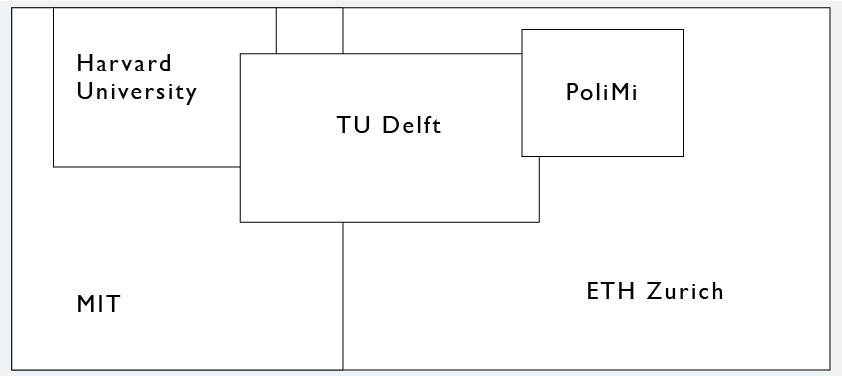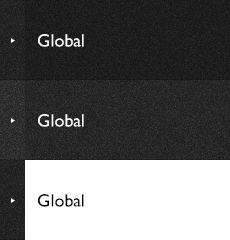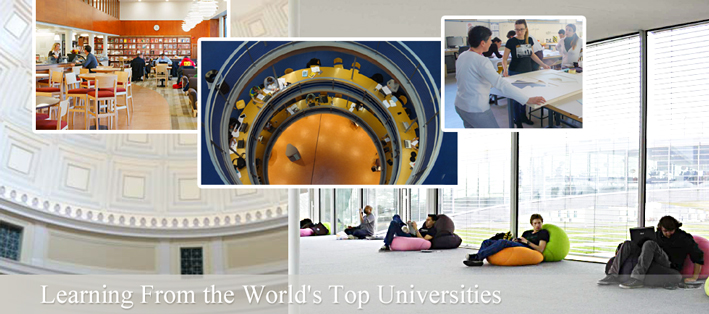
Steps Toward Tokyo Tech's Education Reform
Tokyo Tech is currently formulating a new education system to be launched in the 2016 academic year. It is Tokyo Tech's duty to cultivate global leaders who will contribute to the solving of global issues and innovate in the fields of science and technology. To this end it is imperative that we create an environment to enhance the motivation and abilities of our students at Tokyo Tech.
While carrying out education reform according to our three pillars of building an education system on a par with those of the world's top universities, innovating learning, and promoting ambitious internationalization, Tokyo Tech faculty members and administrative staff visited elite universities abroad to research their leading-edge efforts and exchange opinions with their executive administrations. The research covered curricula, summer schools, degrees, hands-on learning, active learning, problem-based learning, Christmas lectures, libraries, self-study spaces, IT lecture rooms, learning facilities, dormitories, benefits packages, facilities for international faculty members, lifelong learning, and design engineering.
Asia
Country |
University |
Singapore |
Singapore University of Technology and Design (SUTD)
National University of Singapore (NUS)
Nanyang Technological University (NTU)
|
North America
Country |
University |
U.S.A. |
Massachusetts Institute of Technology (MIT)
Harvard University
Brown University
University of California, Berkeley (UCB)
University of California, Los Angeles (UCLA)
California Institute of Technology (Caltech)
|
Europe
Country |
University |
U.K. |
The Royal Institution (Ri)
Imperial College London (ICL)
University of Cambridge
The University of Sheffield
The University of Manchester
|
Belgium |
KU Leuven
Université Catholique de Louvain (UCL)
|
The Netherlands |
Delft University of Technology (TU Delft) |
Germany |
RWTH Aachen University |
Italy |
Politecnico di Milano (PoliMi) |
Switzerland |
Eidgenossische Technische Hochschule Zurich (ETH Zurich)
Ècole Polytechnique Fédérale de Lausanne (EPFL)
|
On May 15 the Tokyo Tech faculty members and the one administrative staff member who conducted this research gave presentations about their visits to these top universities, what was learned there, and what was common among these institutions. In line with the aforementioned three pillars, Tokyo Tech faculty members highlight the following measures as applicable to Tokyo Tech's Education Reform.
Build the Education System of One of the World's Top Universities
Top-quality education
Have multiple faculty members design curricula
At Caltech, the Curriculum Committee (CC) designs curricula. In order to incorporate external opinions, an Advisory Board consisting of representatives of corporations and faculty members of other universities was founded. Every other year a Student-Faculty Conference (SFC) is held to evaluate and give feedback on all curricula.
At Singapore University of Technology and Design, the involvement of multiple faculty members and staff in creating a curriculum for one area or discipline is not uncommon. Additionally, there are curricula where one subject is team-taught by multiple faculty members.
Teaching assistant experiences hone educational skills
In order to improve the quality of education, the educational skills of faculty members are essential.
At ETH Zurich, no matter how excellent a doctoral student is as a researcher, he or she is sure to engage in educational activities as a teaching assistant. In addition to securing financial support from the university, it is important training for becoming a faculty member in the future.
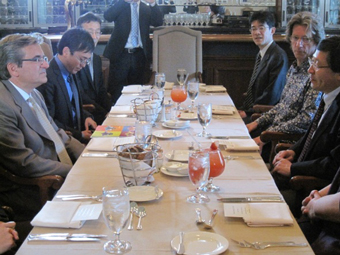
Deans of engineering
Caltech's Dean Ares Rosakis (left); Tokyo Tech's Dean Kishimoto (right)
In experimental or lab classes at Caltech, teaching assistants play an important role, too. They are well paid at about 150,000 yen per month. Although this ties up twenty hours of their week, students emphasize the positive aspect that they are acquiring teaching skills for their future careers. In addition, Caltech has a center which provides practical assistance to faculty members and teaching assistants for designing classes.
Innovate Learning An environment where students take the initiative in learning
Design learning spaces that nurture creativity
The backbone of education at MIT is hands-on learning. For this reason, glass-walled labs and workshops are located all over campus to motivate students both inside and outside of them. There are many spaces where students gather together to study and discuss. Eating spaces and spaces for students to get together can be found in multiple places on campus.
At Delft University of Technology, the laboratories, educational spaces, meeting rooms and storage spaces in the renovated Faculty of Architecture's building (BK City) are commonly shared among the various departments. At the same time, the number of common spaces, such as work spaces, library spaces, cafes and restaurants, were drastically increased. The huge Faculty of Industrial Design Engineering building (IDE) has various types of learning spaces. In this way, the university provides choices to students according to their objectives and needs.
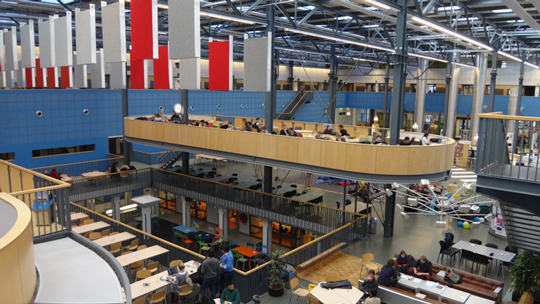
The interior of the Faculty of Industrial Design Engineering building (IDE), Delft University of Technology
Many of the universities visited had well-prepared spaces for active learning in their libraries. At the University of Sheffield, a new facility which integrates a learning commons and a library was established in 2007. Different types of study spaces with various interiors are available for different purposes. For ease of discussion, some spaces have walls that are interactive white boards.
Learning commons are educational spaces where students learn through discussions and the use of a wide range of information in both digital and print formats. A learning commons provides not only equipment, including PCs and print materials, but is also a place where library staff members offer support services to students.
Design flexible curricula which meet students' desires
In order for students to take the initiative in their studies, they need the flexibility to change their course of study halfway through it.
At Delft University of Technology, a student who is enrolled in one program can move to another program or create his/her own program by applying to the Executive Board. The approval of the Examination Committee, comprised of about five faculty members appointed by the dean, is necessary to change programs. Through this system, credit transfers from other departments and universities are possible. In addition, some extracurricular activities can be recognized as credits under this system.
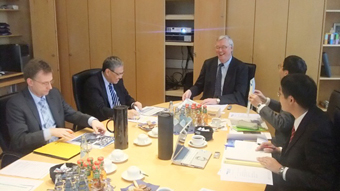
Meeting at RWTH Aachen University
Vice-Rector for Teaching, Professor Aloys Krieg (center)
RWTH Aachen University has a unique system. In order to avoid the situation where a student chooses his/her program without a full understanding of his/her abilities and aptitudes, the university offers students Self-Assessment tests to measure their aptitudes before enrolling. Students are also able to freely change course after enrollment in one program. The Examination Board reviews the student's credits for transfer.
Experience cutting-edge science and technology in classes with experiments and demonstrations
It is important to experience cutting-edge science and technology and realize the importance of learning soon after entering a university. The lecture style used for the Royal Institution's Christmas Lectures serves that purpose.
The Christmas Lectures are a series of lectures by renowned and outstanding scientists on a single topic for students between the ages of 11 and 17. These lectures have been held at the Royal Institution in London each year around Christmas for 188 years, since 1825, except for the years 1939 - 1942. The Christmas Lectures take place in a lecture theater where students sit in a rising semi-circle around the lecturer. The lectures feature many experiments and demonstrations while teaching the fun of science to students. It is especially worth noting that the lecturer does not mention his/her own research and research findings, but focuses on teaching basic scientific thinking. This teaching method is effective when teaching the basics to students.
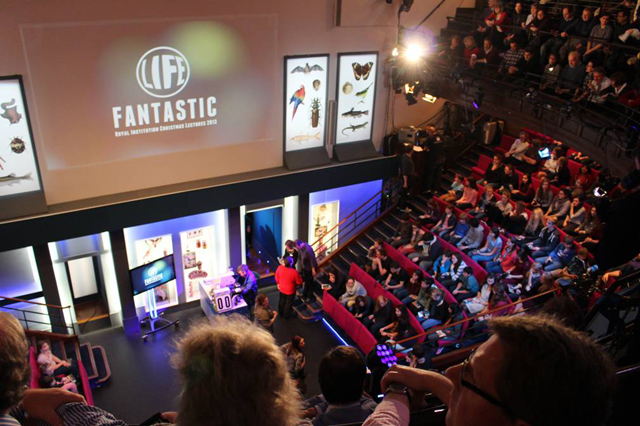
The lecture theatre at the Royal Institution
Photo courtesy of the British Council
Promote Ambitious Internationalization Pushing ahead with study abroad and internships
Promoting international activities and the time for them
Delft University of Technology recommends that undergraduate students study abroad or do internships at corporations in the first half of their 3rd year. Additionally, students can sometimes earn credits by pursuing their passions, such as participating in the international solar vehicle race for example, or some other event or competition.
Nanyang Technological University's business school (NBS) has three internship programs offering internship opportunities in more than 30 countries.
Directions Tokyo Tech's Education Reform should take
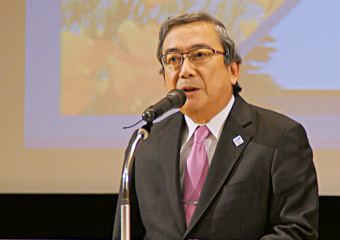
Then-President Yoshinao Mishima
Tokyo Tech will proceed with education reforms taking into consideration the aforementioned efforts of other universities and suggestions from faculty members.
Tokyo Tech will create a new system in which the undergraduate and graduate schools are joined, will completely revitalize its curricula and lectures, and will make them globally accessible. The Institute will establish an education system on a par with those of other top universities in the world by tuning its curricula and lectures so that students can easily transfer credits.
Additionally, the Institute will create systematically structured curricula to support students in pursuing their goals and interests, change the fundamental definition of learning from “ what year a student is in” to “ what and how much knowledge a student gains,” and increase the depth of course content while making the evaluation of learning more rigorous.
With an education system equivalent to those of the world's other top universities, Tokyo Tech will communicate its education and become a global research and education hub attracting outstanding international students and researchers. The Institute will utilize its strengths as a science and technology university to recruit a larger number of students from overseas and foster greater student participation in opportunities abroad.
Currently, institutional designs for specifics are underway. Look for updates about Tokyo Tech's Education Reform on the Tokyo Tech webpage.
Universities depicted in the images at the top of the page are indicated to the left.
The Special Topics component of the Tokyo Tech Website shines a spotlight on recent developments in research and education, achievements of its community members, and special events and news from the Institute.
Past features can be viewed in the Special Topics Gallery.
Published: June 2014
. Any information published on this site will be valid in relation to Science Tokyo.








